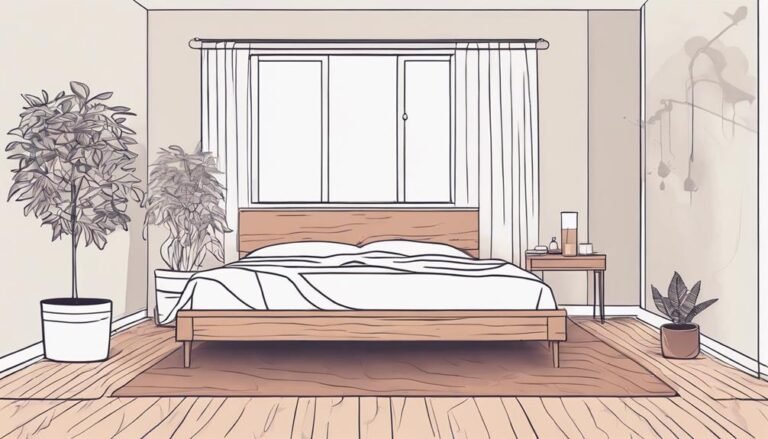10 Ways to Optimize Your Bedroom for Nighttime Restoration
To optimize your bedroom for nighttime restoration, start by decluttering your space and choosing a mattress that suits your sleeping style. Maintain a comfortable temperature, ideally between 60-67°F, and minimize light exposure with blackout curtains. Limit noise with white noise machines or earplugs, and create a calm atmosphere with soothing color palettes. Incorporate relaxing scents like lavender and invest in quality bedding for enhanced comfort. Establish a consistent sleep routine that includes winding down activities, and use technology wisely to improve your sleep environment. Stick around, and you'll discover even more effective tips for rejuvenating sleep.
Key Takeaways
- Declutter your sleep space by removing distractions and using storage solutions to create a serene environment.
- Choose the right mattress based on your sleeping position to ensure comfort and support.
- Maintain an optimal bedroom temperature between 60 to 67 degrees Fahrenheit for restful sleep.
- Control light exposure with blackout curtains and minimize screen time before bed to enhance melatonin production.
Declutter Your Sleep Space
You should start by clearing out any clutter that distracts you from a restful night's sleep. Look around your bedroom and identify items that don't belong. Remove clothes, books, or random objects that accumulate over time. A clean and organized space promotes relaxation and signals to your brain that it's time to wind down.
Consider using storage solutions like bins or baskets to keep essentials tidy while maintaining easy access. Make your bed daily to create a sense of order; it instantly transforms the room.
Limit decorative items to a few that inspire calmness. By simplifying your surroundings, you create an environment conducive to sleep, allowing you to recharge more effectively each night.
Choose the Right Mattress
Selecting the right mattress is essential for ensuring a restful night's sleep and supporting overall health. You should consider your sleeping position, body weight, and personal preferences.
If you're a side sleeper, look for a softer mattress that cushions your shoulders and hips. Back sleepers usually prefer medium-firm options for spinal alignment, while stomach sleepers benefit from firmer mattresses to prevent sagging.
Don't forget to test mattresses in-store or take advantage of online trials. Pay attention to materials too; memory foam can provide great support, while innerspring mattresses often offer breathability.
Optimize Bedroom Temperature

Finding the ideal bedroom temperature can greatly enhance sleep quality and promote nighttime restoration. Aim for a cool environment, typically between 60 to 67 degrees Fahrenheit. This range helps your body lower its core temperature, signaling that it's time to sleep.
If you tend to feel too warm, consider using breathable bedding materials, such as cotton or linen, which wick away moisture. You can also adjust your thermostat or use fans to maintain airflow.
If you often feel cold, layer up with cozy blankets or use a heated mattress pad. Remember to regularly check the temperature and make adjustments as needed, ensuring your sleep space remains a comfortable haven for restorative rest.
Control Light Exposure
Consistently controlling light exposure in your bedroom can greatly enhance your ability to fall asleep and stay asleep throughout the night. Start by investing in blackout curtains or shades to block out external light sources, especially streetlights or early morning sunshine.
You might also consider using a sleep mask to shield your eyes from unwanted light. Dim your bedroom lights in the evening to signal your body that it's time to wind down.
Avoid screens—like phones, tablets, or TVs—at least an hour before bed, as their blue light can interfere with melatonin production. Instead, opt for warm, low-light options like lamps or candles.
Limit Noise Disruptions

Just as controlling light exposure is essential for sleep, limiting noise disruptions in your bedroom can greatly improve your nighttime restoration. To create a peaceful environment, consider these strategies:
| Tip | Description |
|---|---|
| Use Heavy Curtains | Block outside noise and light. |
| Soundproof Windows | Install acoustic panels or seals. |
| White Noise Machines | Drown out disruptive sounds. |
| Earplugs | A simple solution for noise reduction. |
Select Soothing Colors
Selecting soothing colors for your bedroom can create a calming atmosphere that promotes relaxation and better sleep.
Opt for soft hues like light blues, gentle greens, or warm neutral tones. These colors can evoke feelings of tranquility, making it easier for you to unwind after a long day. Avoid bright or overly stimulating shades, as they can create tension and disrupt your peace.
Consider painting your walls or incorporating these colors through bedding, curtains, or decor. You might also use accent pieces to add subtle depth without overwhelming the space.
Incorporate Relaxing Scents

Incorporating relaxing scents into your bedroom can greatly enhance your nighttime routine and promote deeper, more restorative sleep.
Scents like lavender, chamomile, and sandalwood have calming properties that help reduce anxiety and prepare your mind for rest.
Consider using essential oils in a diffuser or placing scented candles around your space. Just be sure to choose natural, non-toxic options to avoid any harmful chemicals.
You can also try pillow sprays infused with these soothing aromas.
If you prefer a more subtle approach, consider using scented sachets in your drawers or under your pillow.
Invest in Quality Bedding
Creating a serene atmosphere with relaxing scents sets the stage, and investing in quality bedding further enhances your sleep experience.
When you choose high-quality sheets, pillows, and comforters, you're prioritizing comfort and support. Look for breathable materials like cotton or linen that regulate temperature, keeping you cozy without overheating.
A good mattress is essential, too; it should provide the right balance of firmness and softness tailored to your preferences. Don't forget about pillows—opt for ones that suit your sleeping position, whether you're a back, side, or stomach sleeper.
Establish a Sleep Routine

A consistent sleep routine helps signal to your body when it's time to wind down and prepare for restorative rest. To establish this routine, try to go to bed and wake up at the same time every day, even on weekends. Incorporate calming activities before bed, like reading or gentle stretching, to further signal your body that it's time to sleep.
Here's a simple table to help you create your sleep routine:
| Activity | Duration |
|---|---|
| Wind-down time | 30 minutes |
| Reading | 15 minutes |
| Meditation | 10 minutes |
| Journaling | 5 minutes |
| Sleep preparation | 20 minutes |
Stick to this routine, and you'll likely enjoy more restful nights!
Utilize Technology Wisely
Using technology wisely can enhance your sleep environment and promote better nighttime restoration. Start by integrating smart lighting that mimics natural sunlight, helping you wake up more refreshed.
Consider using a white noise machine or sleep app to drown out disruptive sounds, creating a calming atmosphere.
Limit screen time before bed; blue light from devices can interfere with your sleep cycle. Instead, use apps that filter blue light or switch your devices to night mode in the evening.
Smart thermostats can also optimize your bedroom temperature, ensuring a comfortable sleep environment.
Ultimately, wearables can track your sleep patterns, providing insights that help you improve your nightly rest. Embrace technology as a tool for better sleep, but use it mindfully.
Questions
How Does Bedroom Layout Impact Sleep Quality?
Your bedroom layout greatly impacts your sleep quality. When you arrange furniture for easy movement, minimize distractions, and prioritize comfort, you create a serene environment that promotes relaxation and helps you achieve deeper, restorative sleep.
Can Pets Affect My Sleep Environment?
Yes, pets can affect your sleep environment. They might disrupt your sleep with movement or sounds, but their presence can also provide comfort. It really depends on your preferences and your pet's behavior during the night.
What Are the Best Plants for a Restful Bedroom?
For a restful bedroom, you'll love plants like lavender, snake plants, and peace lilies. They purify the air, reduce stress, and create a calming atmosphere, making your space more inviting for relaxation and sleep.
How Often Should I Replace My Pillows?
You might not realize it, but your pillows could be harboring allergens. It's best to replace them every 1-2 years to maintain comfort and hygiene, ensuring you wake up refreshed and ready to face the day.
Are There Specific Sleepwear Materials That Promote Better Sleep?
Yes, certain sleepwear materials can promote better sleep. Opt for breathable fabrics like cotton or bamboo, which wick moisture away. Avoid synthetic materials; they can trap heat and disrupt your restful night's sleep.
Conclusion
In the quest for a restful night's sleep, it's essential to create a sanctuary that promotes relaxation.
By making these changes, you'll not only improve your sleep quality but also wake up feeling rejuvenated and ready to tackle the day.
Remember, a good night's sleep is the best medicine, so don't let the small stuff slip through the cracks.
Take charge of your bedroom environment, and watch how it transforms your nighttime restoration!







